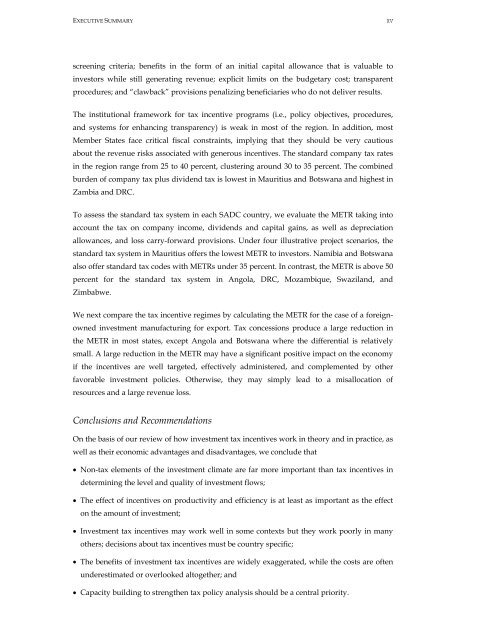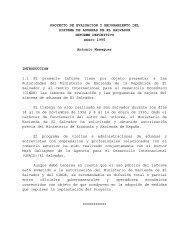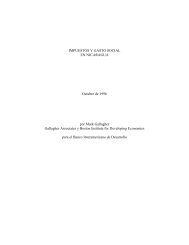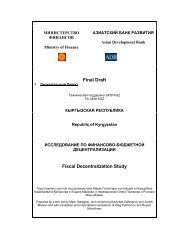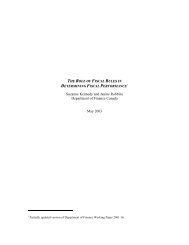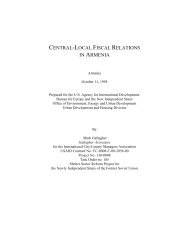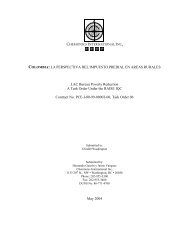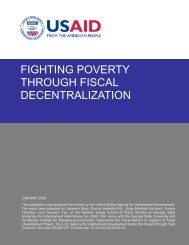Effectiveness and Economic Impact of Tax Incentives in the SADC ...
Effectiveness and Economic Impact of Tax Incentives in the SADC ...
Effectiveness and Economic Impact of Tax Incentives in the SADC ...
Create successful ePaper yourself
Turn your PDF publications into a flip-book with our unique Google optimized e-Paper software.
EXECUTIVE SUMMARY XV<br />
screen<strong>in</strong>g criteria; benefits <strong>in</strong> <strong>the</strong> form <strong>of</strong> an <strong>in</strong>itial capital allowance that is valuable to<br />
<strong>in</strong>vestors while still generat<strong>in</strong>g revenue; explicit limits on <strong>the</strong> budgetary cost; transparent<br />
procedures; <strong>and</strong> “clawback” provisions penaliz<strong>in</strong>g beneficiaries who do not deliver results.<br />
The <strong>in</strong>stitutional framework for tax <strong>in</strong>centive programs (i.e., policy objectives, procedures,<br />
<strong>and</strong> systems for enhanc<strong>in</strong>g transparency) is weak <strong>in</strong> most <strong>of</strong> <strong>the</strong> region. In addition, most<br />
Member States face critical fiscal constra<strong>in</strong>ts, imply<strong>in</strong>g that <strong>the</strong>y should be very cautious<br />
about <strong>the</strong> revenue risks associated with generous <strong>in</strong>centives. The st<strong>and</strong>ard company tax rates<br />
<strong>in</strong> <strong>the</strong> region range from 25 to 40 percent, cluster<strong>in</strong>g around 30 to 35 percent. The comb<strong>in</strong>ed<br />
burden <strong>of</strong> company tax plus dividend tax is lowest <strong>in</strong> Mauritius <strong>and</strong> Botswana <strong>and</strong> highest <strong>in</strong><br />
Zambia <strong>and</strong> DRC.<br />
To assess <strong>the</strong> st<strong>and</strong>ard tax system <strong>in</strong> each <strong>SADC</strong> country, we evaluate <strong>the</strong> METR tak<strong>in</strong>g <strong>in</strong>to<br />
account <strong>the</strong> tax on company <strong>in</strong>come, dividends <strong>and</strong> capital ga<strong>in</strong>s, as well as depreciation<br />
allowances, <strong>and</strong> loss carry-forward provisions. Under four illustrative project scenarios, <strong>the</strong><br />
st<strong>and</strong>ard tax system <strong>in</strong> Mauritius <strong>of</strong>fers <strong>the</strong> lowest METR to <strong>in</strong>vestors. Namibia <strong>and</strong> Botswana<br />
also <strong>of</strong>fer st<strong>and</strong>ard tax codes with METRs under 35 percent. In contrast, <strong>the</strong> METR is above 50<br />
percent for <strong>the</strong> st<strong>and</strong>ard tax system <strong>in</strong> Angola, DRC, Mozambique, Swazil<strong>and</strong>, <strong>and</strong><br />
Zimbabwe.<br />
We next compare <strong>the</strong> tax <strong>in</strong>centive regimes by calculat<strong>in</strong>g <strong>the</strong> METR for <strong>the</strong> case <strong>of</strong> a foreignowned<br />
<strong>in</strong>vestment manufactur<strong>in</strong>g for export. <strong>Tax</strong> concessions produce a large reduction <strong>in</strong><br />
<strong>the</strong> METR <strong>in</strong> most states, except Angola <strong>and</strong> Botswana where <strong>the</strong> differential is relatively<br />
small. A large reduction <strong>in</strong> <strong>the</strong> METR may have a significant positive impact on <strong>the</strong> economy<br />
if <strong>the</strong> <strong>in</strong>centives are well targeted, effectively adm<strong>in</strong>istered, <strong>and</strong> complemented by o<strong>the</strong>r<br />
favorable <strong>in</strong>vestment policies. O<strong>the</strong>rwise, <strong>the</strong>y may simply lead to a misallocation <strong>of</strong><br />
resources <strong>and</strong> a large revenue loss.<br />
Conclusions <strong>and</strong> Recommendations<br />
On <strong>the</strong> basis <strong>of</strong> our review <strong>of</strong> how <strong>in</strong>vestment tax <strong>in</strong>centives work <strong>in</strong> <strong>the</strong>ory <strong>and</strong> <strong>in</strong> practice, as<br />
well as <strong>the</strong>ir economic advantages <strong>and</strong> disadvantages, we conclude that<br />
•<br />
•<br />
•<br />
•<br />
Non-tax elements <strong>of</strong> <strong>the</strong> <strong>in</strong>vestment climate are far more important than tax <strong>in</strong>centives <strong>in</strong><br />
determ<strong>in</strong><strong>in</strong>g <strong>the</strong> level <strong>and</strong> quality <strong>of</strong> <strong>in</strong>vestment flows;<br />
The effect <strong>of</strong> <strong>in</strong>centives on productivity <strong>and</strong> efficiency is at least as important as <strong>the</strong> effect<br />
on <strong>the</strong> amount <strong>of</strong> <strong>in</strong>vestment;<br />
Investment tax <strong>in</strong>centives may work well <strong>in</strong> some contexts but <strong>the</strong>y work poorly <strong>in</strong> many<br />
o<strong>the</strong>rs; decisions about tax <strong>in</strong>centives must be country specific;<br />
The benefits <strong>of</strong> <strong>in</strong>vestment tax <strong>in</strong>centives are widely exaggerated, while <strong>the</strong> costs are <strong>of</strong>ten<br />
underestimated or overlooked altoge<strong>the</strong>r; <strong>and</strong><br />
• Capacity build<strong>in</strong>g to streng<strong>the</strong>n tax policy analysis should be a central priority.


